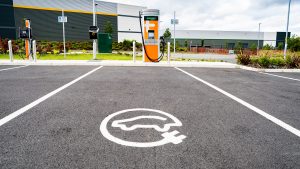A report published by the Geospatial Commission will support local authorities in a bid for EV chargepoints to be installed across local areas.
The sale of new petrol and diesel cars will be phased out by 2030, so it is vital that the UK begins to build a network of EV chargepoints now.
This net zero transition can only be possible with a dependable, well-located public charging network that local authorities are ideally placed to help deliver.
These crucial initiatives are highlighted in the full report, ‘Charging Ahead: Using location data to boost local EV chargepoint rollout’.
The commercialisation of EV chargepoints is crucial for a green transition
EV chargepoints play an important role in the world’s aim to become more efficient, greener, and safer.
The Geospatial Commission has been leading a multi-year programme highlighting the opportunities for advanced geospatial applications in the transport sector.
“The rollout of EV chargepoints plays a critical role in enabling better decision making on how society can make a rapid transition to achieving a low carbon economy,” stated Martin Tugwell, Chief Executive, Transport for the North.

How can location data inform authorities?
Location data can arm local authorities with evidence to roll out a public charging network that gives current and prospective EV owners the confidence to make their journeys, whether in a densely populated city or the countryside.
It’s important for drivers to know that they can access EV chargepoints in the same way they can refuel their current diesel or petrol vehicle if the energy transition is to be successful.
Viscount Camrose, Minister, Department for Science, Innovation and Technology, explained: “The transition to electric vehicles is central to the government’s plan to decarbonise the transport sector.
“Local authorities and the wider sector should continue to embrace new location data and analysis to accelerate the targeted rollout of EV chargepoints so that drivers can find and access reliable chargepoints wherever they live.”
The report explores the breadth of location data and applications available to support local authority decisions about where to install new chargepoints.
It also identifies five opportunities to better use existing location data, as well as new sources of information to:
- Understand the location and availability of existing EV chargepoints by making chargepoint operator data standardised and consistent;
- Understand consumer charging behaviour and travel patterns by using population movement data;
- Identify the location of EVs by using commercially-held data about leased vehicles;
- Identify existing electricity network capacity through better use of distribution network operator data; and
- Identify areas without off-street parking by using proxy data.
Steve Ward, Decarbonisation Programme Manager, Transport for Wales, concluded: “Good quality location data is essential to us helping the public and private sectors collaborate to identify and develop sites for EV chargepoints.
“We have worked with datasets from a large number of sources to develop modelling tools that indicate which locations are more suitable for commercially-funded charging facilities, and which could be unlocked by targeting investment in improving electricity supply capacity.”









